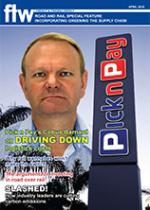The economic argument of road
versus rail has little to do with
the transport cost of moving
goods from A to B. The positive
externalities of road far exceed the
transport costs – and that’s where
the debate needs to take place, in the
view of transport economics adviser
at Arup Transport Planning, Andrew
Marsay.
There’s no doubt that the
environmental benefits of rail far
outweigh road, but what hasn’t been
adequately quantified is the positive
economic benefits of road. Road
has enabled manufacturing to take
place in more locations than was
ever possible with rail, says Marsay.
“In addition, there’s the
manufacturing optimisation. You
can offer small amounts of goods
frequently throughout the day
in many locations. “The final
manufacturing location is often
a very small part of the total
manufacturing process with many
‘feeder’ manufacturing locations
able to locate remotely in places
more economic for their purposes.
By facilitating the disaggregation
of production processes in this way,
efficient road transport technology
has brought massive efficiencies to
the manufacturing sector over the
past few decades.”
A research project undertaken
for the Department of Transport
in 2008 examined how to
increase investment in transport
infrastructure in a sustainable
manner. “We had to review the
relationship between transport
infrastructure and economic
development over a long period.
“The research showed that
investment in paved roads pushes
GDP and enhances it whereas
investment in additional railway
capacity follows GDP.”
There’s no question that rail does
some things best – bulk coal and
bulk rail over long distances, for
example. “But Transnet doesn’t tend
to prioritise these to the extent is
warranted by the viability of their
successful bulk haulage businesses.
“They want to target general
freight business because the revenue
on a container is very high. But
international evidence as well
as history here in South Africa
indicates there is simply not a good
economic case for general freight
rail investment.”
In revenue terms, Transnet’s
strategy may appear rational – but
the true costs involved in achieving
these revenues are artificially
hidden. “Transnet’s privileged
position as the monopoly owner
and operator of the country’s ports
and pipelines gives it an artificially
protected cash flow that enables
it to raise capital and put it into
whichever area of freight rail it
thinks is a good thing.
In Marsay’s view, billions are
being invested in rail on the basis
of the true, but only partial analysis,
that when rail is efficient it can have
a much lower cost per kilometre on
long hauls than road transport.
“But most of the value is not
in the transport cost but in the
economic externalities.”
If it were purely down to transport
costs rail should have 60-70% of the
market but it doesn’t. “It has only
15% even on the Gauteng-Durban
corridor – which is clear evidence
that there’s something other than
transport costs at work.”
‘Benefits of investment in road far exceed rail’
16 Apr 2010 - by Joy Orlek
0 Comments
Road And Rail 2010

16 Apr 2010
16 Apr 2010
16 Apr 2010
16 Apr 2010
16 Apr 2010
16 Apr 2010
16 Apr 2010
16 Apr 2010
Border Beat
Poll
Featured Jobs
New
New
New
